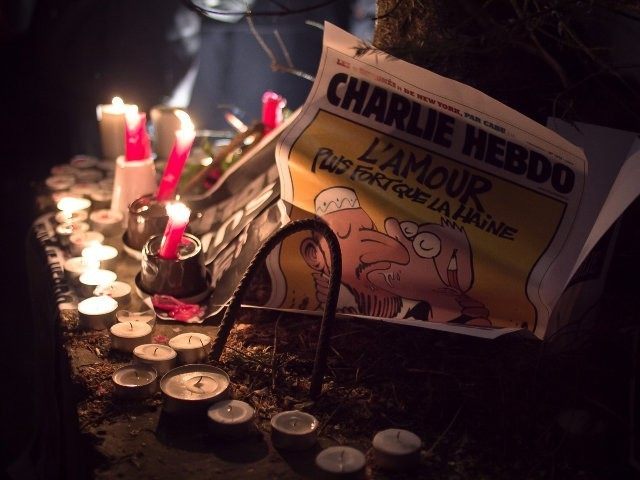Not all terrorists are created equal.
For every social media-savvy, iPhone-toting ISIS propagandist or evil, villainous mastermind holed up in a Pakistani dug-out, there is an underwear-scorching cretin who fails, pathetically, to blow up a plane. Or a Parisian hood-rat in a stained skull-cap who believes that taking shots at cartoonists is an appropriate way to express his devotion to Allah.
We learned yesterday that the Paris killers were so dunderheaded that they invaded the wrong building before at last stumbling upon the offices of Charlie Hebdo and making it rain, as military people say, on innocents. You can picture the scene: balaclavas, broken glass, ululations, and the screaming of a terrified receptionist before silence, briefly exchanged mumbles in surburban French, and, finally, a red-faced retreat back out the door.
It is a farcical picture, as funny as anything in the pages of Charlie Hebdo itself. The magazine’s editors and cartoonists, had they lived, would have found it just as entertaining as the rest of us, I feel sure. The incompetence of terrorists is by now a well-established phenomenon. Those cartoonists found lots of things funny about Islam, of course, and they shared their mischievous laughter with the world, to the delight of thousands.
Because Islam is, let us be honest, rich in comic potential, as any person or movement that takes itself too earnestly inevitably is. It is not my intention here to be gratuitously disrespectful to Islamic culture, beyond what is obviously unavoidable—though, by all means, look out for that in a future column. But come on. All those men with their bums in the air five times a day, that awful noise from the minarets, the beards, the dresses, the guns, the stonings, the furiousness of it all. It’s hilarious!
And I believe our reaction to this tragedy, too, should be expressed in humorous terms. Our reaction should be laughter at the ridiculous, patronising burka that gives rise to such absurdly comic vistas en masse; laughter at how pathetically Islam thrashes around in its futile attempt to engage with modernity; laughter at the idea that violence against our society and our ideals can have any possible outcome but contempt.
Finally, perhaps, our response should be hope: hope that ridicule and not retaliation is our response. Because in the bleak twilight of French grief, when it seems that nothing could ever make good on the loss and violation that these animals have unleashed in one of the world’s great capital cities, what ought to ring out loud and true are not the echoes of gunfire—but guffaws at the proposition that subhumans with submachine guns will undo the achievements of our civilisation.
If there is to be a legacy of this crime, once the respectful silence has dissolved, it should not be violent vigilantism, though I know many will share in that first instinct which I, too, felt on hearing the news. I can’t speak for you. My first thoughts were: there must be revenge. An ugly reaction, perhaps—but I hope an understandable one.
Yet what separates us from the murderers in our streets and schools, living among us unmarked but for their wispy, teenage beards and shifty countenances, is our ability to think and feel such things and not act on them, in the—hopefully well-placed—belief that our elected representatives and their agents will take up the cudgels of retribution.
Our civilisation is what marks us out from the monsters in the Middle East: it is what they hate so much about us. Our power to express our ideas, however “offensive” they may be. Our prosperity. Our freedom. If we give up these things and take revenge upon ourselves, it is a victory for the bad guys. They will have provoked us into the war they want.
Involuntary laughter is a common response to great shock and grief; this sometimes surprises those who visit grieving families. But our laughter now should be clear and strong and proud, and we should share it with the world. For, in the chaos of our collective tragedy, there is only one thing known for sure: the staff of Charlie Hebdo are laughing along with us from their seats in the clouds.
Already, national newspapers around the world have reprinted the cartoons that so offended these beasts, these excuses for men, giving them reach and currency undreamed of by their original publishers. Some media organisations, such as the BBC, have shied away from publishing them, to their eternal shame.
But enough have done so, and members of the public have, too, on social media and in private emails and letters, to demonstrate perhaps the most immutable law of the internet era: that which someone powerful, or intimidating, takes measures to conceal, will inevitably reach vast audiences.
The strongest weapon against reputation is ridicule—something of which the Internet is an unparalleled engine. Let our leaders take on the ugly but necessary responsibilities of punishment; for everyday people scared by what is happening in their cities, there is another front on which to fight. Our weapons are puns, innuendo, sketches, slapstick, and withering put-downs. It would be an incalculably fitting legacy, wouldn’t it, for the killers of those cartoonists if their only accomplishment was to hold up militant Islam for ridicule and contempt.
So that’s what we should do. If there is one thing authoritarians hate more than anything else, it is laughter. Perhaps, if we lead the way, our craven comedians, who shrink from ridiculing the barbarities of Islamism—with the honourable exception, incredibly, of Bill Maher—will find courage within themselves to do the same. It is, after all, richly, obviously deserved. I mean, let’s face it: is there any other religion so ostentatiously ripe for a good skewering?
Follow Milo Yiannopoulos on Twitter.

COMMENTS
Please let us know if you're having issues with commenting.